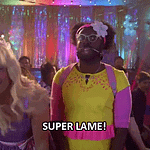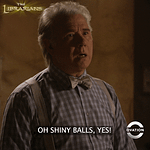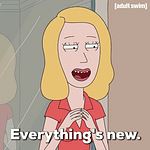The giant Tim Ferriss edition
This turned out to be Reading notes #7, not #6. Whatever.
I don’t mean that Tim Ferriss is a literal giant, but that this edition is a giant recap of 3 Tim Ferriss books.
Here we go.
So 2019 was, apparently, the year of reading Tim Ferriss books. Among other things.
I’ve read a good bit of his blog before, but, I think, none of his books. Till last year. Last year I read The Four-Hour Workweek, Tools of Titans, and Tribe of Mentors in their entirety. I also read a good bit of The 4-Hour Body, but that is a massive endeavor and super detailed and while many topics are very interesting, many of them are not. To me. I’m not super into knowing how I can make my biceps bigger and what combination of supplements I can take to maximize such endeavors. If he had something about naturally increasing bust size, now… that could be interesting. Anyway.
Let’s dive in.
The Four-Hour Workweek
If you’ve been on The Internet in the last decade, you’ve heard of Tim Ferriss and the four-hour workweek.
I don’t think we need another recap here, as there are already many recaps, summaries, critiques, and the like available. Plus, most of the book’s content is on Tim’s blog, or at least the main points. And then those points have been reconfigured, responded to, expanded on, etc., by many other bloggers and writers and Internet-y people.
And, since I have been an Internet inhabitant for most of my adult life, the majority of this book was not new or groundbreaking for me.
It’s interesting to read a book for the first time, though, and realize how much you’ve been influenced by it.
Here are a few points that stand out to me:
1. The sooner you trust yourself to make your own rules, the sooner you start living the life you want to live.
“The commonsense rules of the “real world” are a fragile collection of socially reinforced illusions.
The manifesto of the dealmaker is simple: Reality is negotiable. Outside of science and law, all rules can be bent or broken, and it doesn’t require being unethical.
The important distinction is that between official rules and self-imposed rules.”
2. The obvious and/or popular path is usually the one to avoid.
“The options are limitless, but each path begins with the same first step: replacing assumptions.”
3. There’s good stress and there’s bad stress.
“Role models who push us to exceed our limits, physical training that removes our spare tires, and risks that expand our sphere of comfortable action are all examples of eustress—stress that is healthful and the stimulus for growth.”
4. The fear of discomfort will stop you far more often than discomfort itself.
“The luxury I advocate has nothing to do with money. It cannot be bought. It is the reward of those who have no fear of discomfort.” (quoting Jean Cocteau)
“There is a direct correlation between an increased sphere of comfort and getting what you want.”
5. An important note on defining happiness: look for excitement.
“It’s a matter of specificity. “What do you want?” is too imprecise to produce a meaningful and actionable answer. Forget about it.
Excitement is the more practical synonym for happiness, and it is precisely what you should strive to chase. It is the cure-all. When people suggest you follow your “passion” or your “bliss,” I propose that they are, in fact, referring to the same singular concept: excitement. This brings us full circle. The question you should be asking isn’t, “What do I want?” or “What are my goals?” but “What would excite me?””
6. Choose your partners—whether friends or colleagues—carefully.
“If someone isn’t making you stronger, they’re making you weaker.”
There is lots of other good practical advice and motivation about things like language learning, reading, learning in general, being effective and efficient, hiring and delegating, focusing, building a business, making decisions, and more. If that sounds like interesting stuff to you, read the blog or get the book and dive in.
Tools of Titans
Tools of Titans is a collection of interesting and helpful notes that Tim pulled from his podcast interviews.
There’s a focus on what he calls “actionable details.”
Specific questions, such as “What is your workout routine?” Or “How do you spend the first hour of your morning?” Or “What books do you recommend most often?” lead to specific, detailed answers. Because the answers are specific and detailed, they’re going to either be super helpful and applicable to you, or not really interesting at all…
I have a lot of highlights from this book, so I guess that means a lot of the advice was super helpful and applicable for me.
Have I actually applied any of it? There’s a good question.
Here’s what I’ve taken from this book that has actually been implemented, in one way or another, in my life:
1. Book recommendations
I added a lot of books to my reading list from both this book and the Tribe of Mentors book. Unfortunately I didn’t really keep track of which books those were and I don’t want to spend time cross-referencing, so I don’t really know how many of those books I read. Oh well. Moving on.
2. Fasting
I did more fasting last year. A period of intermittent fasting, several 1 and 2-day fasts, and one 5-day fast with my husband and one of our best friends in which, on day 3, I began vomiting water. That was a fun time. I should have paid more attention to the advice on fasting before I did the 5-day fast. Anyway, I had a protein shake and felt better and finished the fast with coconut water. Does it still count? I say yes.
3. Lowering cortisol
There’s some interesting info about lowering cortisol. Turns out that when you have a hysterectomy and go full-force menopausal, your body responds with all sorts of hormone wackiness, and making way too much cortisol is part of that. Too much cortisol is not fun. Cortisol does not make you feel good and it can really fuck up, among other things, your ability to deal with stress, your emotions, your moods, your sex life, your general sense of well-being. Yeah. Lots of shit.
4. The cossack squat!
Which is a squat that… Oh god, just look it up, I am not going to try to describe it. I was just starting to run regularly and having a lot of pain in my calves and ankles. I started doing cossack squats and it helped enormously. I still do them every time I run because if I don’t, guess what? Pain happens. I don’t like pain.
5. Bare feet
There was a recommendation to let kids run around in flat shoes (like Vans or Chuck Taylors) or be barefoot “as much as possible.” I didn’t change anything based on this recommendation: I just felt better about my parenting, because our kids are barefoot most of the time, and when they’re not barefoot they’re probably wearing Vans or flip flops. So, cool. Validation.
6. Meditation
This is a thing I was already doing, but not consistently. A vast majority of the people interviewed has some type of “daily mindfulness practice” which was affirming and validating and helped up my motivation to be more consistent with morning meditation.
7. Journaling
Same as meditating. I’ve been keeping a journal since… I don’t know, forever. I have a box of notebooks from the journaling I’ve done since moving to Puerto Rico. It’s always nice to hear affirming things about one of your regular practices. I didn’t really change anything about how I journal— there were recommendations for specific questions to write about every day, or other formats. I’m sure those are helpful but it works pretty well for me to just sit still and write shit for 20 or 30 minutes every morning.
8. Don’t beat yourself up over setbacks, and don’t worry about the timeline.
And focus on the process.
This point and the next, about making a single big decision, instigated or influenced a major mindset shift in my approach to life and goals and progress.
“Throw out a timeline. It will take what it takes.”
“…quality long-term results require quality long-term focus. No emotion. No drama. No beating yourself up over small bumps in the road. Learn to enjoy and appreciate the process. This is especially important because you are going to spend far more time on the actual journey than with those all too brief moments of triumph at the end.”
9. Make a single big decision rather than a lot of small decisions.
This has been a really helpful concept for me.
“If the commitment is to a long-term goal and not to a series of smaller intermediate goals, then only one decision needs to be made and adhered to. Clear, simple, straightforward. Much easier to maintain than having to make small decision after small decision to stay the course when dealing with each step along the way. This provides far too many opportunities to inadvertently drift from your chosen goal. The single decision is one of the most powerful tools in the toolbox.”
And I’ll end with this one… There are more, but this is already turning into a monstrously long thing, so time to cut it short.
10. Trust starts with vulnerability, not the other way around.
This is one of those ‘in hindsight, I see that this concept has seeped into my brain and been subconsciously influencing me” moments. Trust and vulnerability have been coming up over and over for me lately.
Here’s the quote from the book:
“People always [think] you gain trust first and then you’re vulnerable with people. But the truth is, you can’t really earn trust over time with people without being somewhat vulnerable [first].”
Tribe of Mentors
Tribe of Mentors is another book of collected advice or notes or questions and answers. It is big and I made a fuckton of highlights, so I guess I liked it.
How do I narrow this down?
I’m going to pick 5 things out of my 666 highlights. Yeah. Otherwise this little reading note will become as long as the book.
1. What would this look like if it were easy?
I’ve been asking myself this question about all sorts of things for the last 6 months or so, and I couldn’t remember where it came from. Now I know, because here it is, in my highlights. Thanks, Tim, or whoever it was who said this in your book. It’s a good question. I find myself having less and less patience for needless suffering, for self-induced suffering, and for hard work for hard work’s sake. I’m not sure really of the long-term effects of this shift, but… I’m interested. We’ll find out.
Along those lines, one point that’s stayed with me is to ask better questions. Here’s a good quote for that:
“Life punishes the vague wish and rewards the specific ask. After all, conscious thinking is largely asking and answering questions in your own head. If you want confusion and heartache, ask vague questions. If you want uncommon clarity and results, ask uncommonly clear questions.”
2. Be yourself because that’s better than anything else.
“I started out basically imagining I was writing for a stadium full of replicas of myself—which made things easy because I already knew exactly what topics interested them, what writing style they liked, what their sense of humor was, etc. I ignored the conventional wisdom…By focusing inward on yourself as a writer instead of outward on what you think readers will want to read, you’ll end up creating the best and most original work, and that one-in-a-thousand person who happens to love it will end up finding their way to you.”
That was a theme for so many of these responses from really, wildly successful people in a variety of fields and endeavors. So many of them said something along the lines— I stuck with my interests, or I did the thing that made sense to me, or appealed to me. Or, something like, I was working on this conventional path and pursuing “my thing” on the side, and what turned out to work, to spark, was “my thing” — the thing I was doing from the heart, with love and curiosity, not for an end goal or to prove myself, but because I found it interesting and rewarding.
3. Focus on the minutes and the hours—and the days, months, years, decades will work themselves out.
“Everybody’s impatient at a macro, and just so patient at a micro, wasting your days worrying about years. I’m not worried about my years, because I’m squeezing the fuck out of my seconds, let alone my days. It’s going to work out.”
There’s something to that whole “be in the moment” concept. I’ve hated that advice forever, because I like planning and I like big long-term goals and I like feeling like I have some idea of what’s coming, of where I’m going.
More and more I see that choosing your path is about choosing your next step, your right-now step, your best option in this moment… not about having a carefully constructed plan for every step from here to some envisioned end goal. Everything changes along the way. The map is not the territory, and the plan is not ever ever how it works out in reality, and maybe that’s a good thing. Maybe that’s what allows life to be exhilarating and rewarding instead of boring and predictable. Maybe it’s also what creates a lot of fear and instability, but oh well. Maybe we can learn to deal with that, and let there be room for surprise and delight in the unexpected.
4. Failure is learning.
“Because I woke up the next day and the world hadn’t ended. I was free to keep fucking up and getting better. I wish at least one catastrophic failure on everyone pursuing the arts. It’s where you’ll get your superpowers from.”
“Because each one of those difficult decisions that looked like failures (at first) took me a bit closer to my real self. Each one of them empowered the real me. Each one of them woke me up from the illusion.”
5. Quality matters.
This was a common theme— that choosing quality makes a huge difference. Particularly in the things that are a regular, ongoing, or large part of your life. This makes sense and seems obvious—the quality of the stuff in your life will impact the quality of your life.
Duh.
But thinking about quality in terms of stuff is one thing.
The point that has stayed with me is thinking of quality in other, less tangible areas: questions you ask yourself, goals and opportunities you pursue, perspectives and beliefs you allow, and relationships you form.
Rather than being open to everything, available to whatever comes along—you can assess and choose. And when you choose high quality, and put energy into those high quality choices consistently, you gain incredible value in return.
Books, always books
There are about a million books recommended— this is where I found the recommendation for Finite and Infinite Games, which is an amazing book and I love the description (so much better than my wordy fumbling notes): “this small, short book provided me a vocabulary to think about the meaning of life.”
Yes. Exactly.
Really, lots of great stuff. Tribe of Mentors is a good book to flip through, find the parts that speak to you and skip the rest. I’ll end with a quote:
“Most of the world is asleep today, playing a small role in a gigantic illusion. You don’t have to be. You can choose a different life. It’s all within. You will know the answers when you take the time to find yourself and trust yourself.”











Reading Notes #7